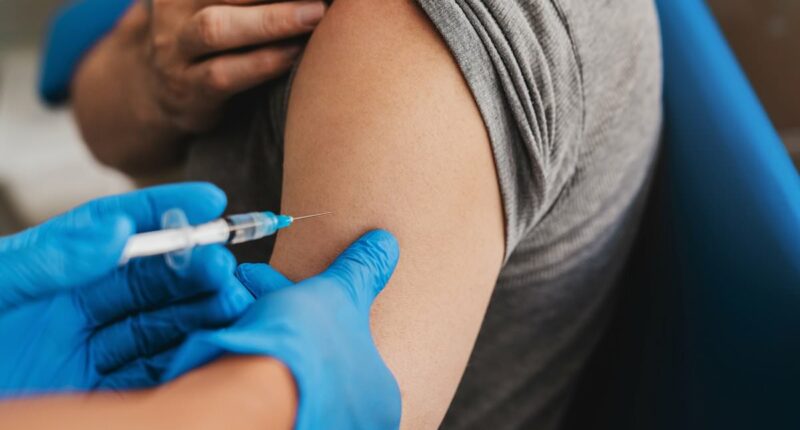Share this @internewscast.com
British health officials have responded strongly to criticism following their decision not to disclose data potentially connecting the Covid vaccine to excess deaths. The move has sparked a heated debate among lawmakers and the public.
Last year, a bipartisan group comprising 21 MPs and peers, including Reform MP Danny Kruger and Conservative MP Miriam Cates, raised concerns regarding the UK’s excess death rates since 2020. They highlighted the increasing public and professional unease surrounding this issue.
In a formal letter addressed to the UK Health Security Agency (UKHSA) and the Department for Health, the group alleged that data detailing the timeline of Covid vaccine doses relative to individuals’ deaths had been shared with pharmaceutical companies but remained undisclosed to the public.
The letter, coordinated with the advocacy group UsForThem, called for the data to be released under freedom of information legislation. The group argued that transparency was essential to address the growing concerns.
However, the UKHSA defended its decision, stating that releasing the information might lead to misinformation that could negatively impact public confidence in the vaccine. They emphasized that the potential for misinterpretation could hinder vaccine uptake across the country.
Additionally, the health agency expressed concerns that publishing such data might harm the mental health and well-being of families and friends of those who have passed away. They stressed the importance of considering the emotional ramifications alongside the public’s right to information.
Now, the Information Commissioner has also ruled in the UKHSA’s favour, backing its refusal to publish the data.
The link between Covid jabs and excess deaths has previously been dismissed by public health scientists and virologists after claims the jab had led to higher mortality rates globally.

Korean researchers said they found proof the jabs raised the risk of six types of cancer including lung, breast and prostate
Excess deaths are a measure of how many more deaths are being recorded in a country over what would have been expected based on historical trends.
Possible explanations by scientists for these excess deaths have included longer-term effects of earlier Covid infections, adverse effects of lockdowns on physical and mental health, and delays in diagnosing life-threatening conditions as health services struggled to cope with the pandemic.
But, Ben Kingsley, the legal director of UsForThem, told The Telegraph: ‘You have to ask yourself why it is that the public are considered incapable of handling this data.
‘It reveals a patronising mindset, which also characterised the pandemic response – “do what we say, don’t ask any questions, we know what is best for you”.
‘We don’t know if the data would reveal any evidence of correlation, let alone causation, but we can see they are desperate to avoid having to answer that question in public.’
A UKHSA spokesman said: ‘Protecting patient confidentiality is of critical importance. Releasing this data presented a real possibility that it could be used to identify individuals, which could result in significant distress.
‘UKHSA provided a carefully anonymised version of the dataset that removed the risk of identification. We welcome the decision of the tribunal to dismiss the appeal.’
Latest figures show that child vaccination uptake is also the lowest it has been in more than a decade.

A 2022 study led by academics at Imperial College London suggests almost 20million lives were saved by Covid vaccines in the first year since countries began rolling out the jabs, the majority in wealthy nations
Uptake in some local authorities is as low as 60 per cent, while the England-wide rate for the final quarter of 2024/25 for measles, mumps, and rubella (MMR) was 88.8 per cent, down from 92.7 per cent 10 years ago.
Excess deaths data is monitored by the Office for Health Improvement and Disparities (OHID) for England.
It is calculated by comparing the number of deaths reported each week to an average for the preceding five years.
During the Covid pandemic, excess deaths peaked in the week ending April 17 2020, when 11,683 more people died than expected.
Over the 52 weeks of data recorded for the pandemic, between March 21 2020 and March 19 2021, an average of 2,072 excess deaths were recorded each week.
But this is almost four times the 519 weekly excess deaths recorded between December 31, 2022 and December 29, 2023.
The Office for National Statistics (ONS) also publishes estimates of excess mortality in England each week, by providing estimates for sex and age group, which complements the OHID figures.
For 2025, the ONS has estimated that there have been fewer deaths than expected in most weeks in England, with a total of -21,479 excess deaths up to the week ending September 26.
In September 2025, there were no excess deaths in any of the English regions, according to the data, with the North West region having the largest negative excess at minus 12 per cent.
In 2023, an ONS analysis matching death registrations with the vaccine histories of each death recorded, also found that in all months from April 2021 to May 2023, the death rate from all causes was higher in the unvaccinated than in people who had been vaccinated at least once.
Research by the World Health Organization (WHO) now puts the number of lives saved by the Covid vaccines at around 475,000 in the UK with many more kept out of hospital or off a ventilator.
However, Covid vaccines, like any medical treatment, do carry some risk.
Research has shown that AstraZeneca and Johnson & Johnson vaccines were linked to a rare, but serious, blood clot in the brain and their use was restricted to certain groups.
The Pfizer and Moderna jabs, meanwhile, have been linked to rare cases of heart inflammation.
It comes as Aseem Malhotra, an advisor to US Health Secretary Robert F Kennedy Junior, claimed in September that the Covid vaccines were linked to the King’s and the Princess of Wales’s cancers.
Speaking at Reform UK’s conference, he said: ‘One of Britain’s most eminent oncologists Professor Angus Dalgleish said to me to share with you today that he thinks it’s highly likely that the Covid vaccines have been a significant factor in the cancers in the royal family.’

It also comes as Reform UK last week distanced itself from Aseem Malholtra, an adviser to US health secretary Robert Kennedy Jr, who suggested at its conference that Covid jabs were linked to the King and Princess of Wales’s cancers
In his speech in Birmingham, at an event titled ‘Make Britain Healthy Again’, Dr Malholtra also claimed that studies show that mRNA vaccines could alter genes.
Dr Malhotra, a cardiologist, also said taking the Covid vaccine was more likely to cause harm than the virus itself.
But his claims attracted widespread criticism, with experts in viral immunology arguing that there is ‘no credible evidence that these vaccines disrupt tumour suppressors or drive any kind of process that results in cancer’.
Health Secretary Wes Streeting also said that it was ‘shockingly irresponsible’ of Reform to allow Dr Malholtra at the conference.
The party said that it ‘does not endorse what he said but does believe in free speech’.
In 2023, Springer Nature was forced to apologise and retract a contentious study in one of its journals BMC Infectious Diseases, after it wrongly claimed Covid vaccines have killed up to 280,000 people across the US.
Spikes in Covid cases can still cause mass illness across the country, sparking chaos in schools, the health service and public transport.
But officials also no longer track the prevalence of the virus in the same way they used to, as part of the Government’s ushering in of pre-Covid normalities.
Currently, only over-75s, people aged between six months and 74 with weakened immune systems and care home residents are eligible for the winter Covid booster, available on the NHS app, online, or at walk-in centres.













